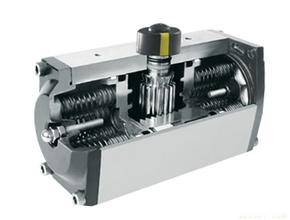The single-acting cylinder has only one chamber that can input compressed air to achieve movement in one direction. Its piston rod can only be pushed back with the help of external force;usually with the help of spring force, diaphragm tension, gravity, etc.
The unique advantages of single-acting cylinders: the cylinder spring recovery speed is stable and is not affected by changes in air pressure. Single-acting has a single function than double-acting. (For example, double-acting can be connected to the three-position five-way middle seal, medium voltage, etc. to achieve safety functions, but single-acting cannot achieve this function.
When is it appropriate to choose a single-acting cylinder and when is it appropriate to choose a double-acting cylinder
The strokes of single-acting cylinders and double-acting cylinders are the same, and the selection is mainly based on specific user requirements. Single-acting cylinders are generally used in situations where power and gas are cut off, and the valve is required to be opened or closed. Single-acting ones are more expensive than double-acting ones, and double-acting ones are generally used. The specifics still depend on the user’s choice.

The difference between single-acting cylinder and double-acting cylinder
1. Switch action
The switching action of the double-acting cylinder is driven by the air source;ventilation is opened, vented is closed, and the air is cut off to remain in place;for single-acting switching, only the opening action is the air source drive, while the closing action is spring-return.
2. Type
Single-action is divided into: normally open type and normally closed type.
Normally open type: Ventilation is off, and air is off is on;Normally closed type: Ventilation is on, and air is off is off.
3. Function
Single action has a single function than double action. For example, double-acting can be connected to the three-position five-way center seal, medium voltage, etc. to achieve safety functions, but single-acting cannot achieve this function.
4. Working principle
Double-action: When the air source pressure enters the middle cavity between the two pistons of the cylinder from the air port, the two pistons are separated and moved toward both ends of the cylinder, and the air in the air chambers at both ends passes through The air port is discharged, and at the same time, the two piston racks synchronously drive the output shaft (gear) to rotate counterclockwise.
Single-acting: When the air source pressure enters the middle cavity between the two pistons of the cylinder from the air port, the two pistons separate and move towardThe cylinder moves in both directions, forcing the springs at both ends to compress, and the air in the air chambers at both ends is discharged through the air ports, and at the same time, the two piston racks Synchronously drives the output shaft (gear) to rotate counterclockwise.






 WhatsApp: +8615857777578
WhatsApp: +8615857777578